Australian Army Chief Simon Stuart offers ‘sincere apology’ to veterans
Australian Army chief General Simon Stuart sang his own tune at the Royal Commission into Defence and Veteran Suicide.
Leaders
Don't miss out on the headlines from Leaders. Followed categories will be added to My News.
Elton John might have believed that Sorry Seems To Be the Hardest Word in his global smash hit of that same song title.
But if Australian Army chief General Simon Stuart had ever heard it, he apparently didn’t agree as he sang his own tune.
After almost three years, 6000 submissions and 300 live witnesses summonsed to the Royal Commission into Defence and Veteran Suicide, the ADF officer uttered the one word rank and file, veterans and their families have longed to hear – sorry.
“What I want to do and to put on the record is, as the Chief of the Australian Army, past and present, I offer an unreserved and sincere apology to everyone whom we have failed,” he said after completing his evidence.
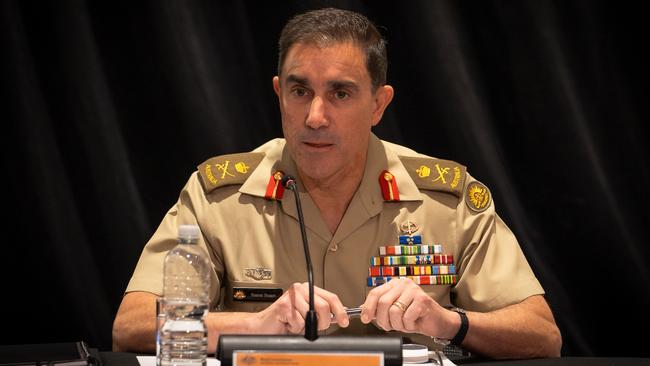
The royal commission this week completed its final hearings and taking evidence and will now produce a report to go to the Governor-General in June, then be made public in September.
The commissioners are determined their findings and recommendations will spark a fundamental shift to attitudes, culture and accountability within the ADF, Defence and the Veterans Affairs Department to deal with what has been described as a “national tragedy”.
And that move apparently started this week with that one word sentiment from Gen. Stuart.
It did take until the last moments of the almost three-year-old inquiry into Defence-related suicides but, after his clearly genuine apology was made, Commission chair Nick Kaldas nodded in acknowledgment and thanked the officer as he moved to close the hearing.
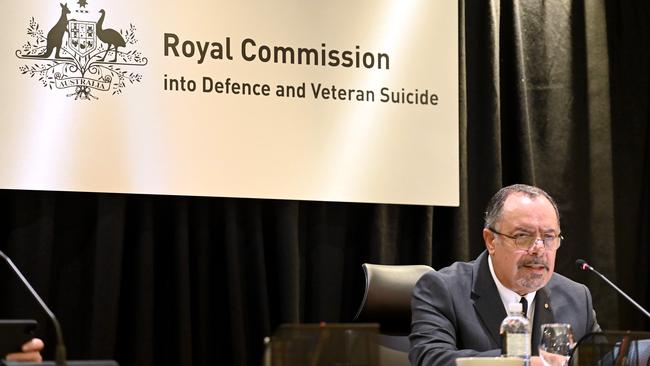
Gen. Stuart suddenly then snapped back “I haven’t finished commissioner”.
You could have heard a pin drop as the emotional officer paused, recomposed and swallowed hard to continue.
He went on to thank those hundreds of veterans, serving personnel and their families who have told their horror personal stories to the public for their “courage”, he thanked them for their service, then he thanked the 50,000 Australians who wear the uniform today.
He also thanked the royal commission, its lawyers, staff and the commissioners for their difficult work and the difference he believed it would make.
“And if I can finish just by saying that to the point that commissioners are seeking an assurance about ownership, I can give you that assurance. I own this problem, we own this problem, and we are committed to doing something about it.”
It was perhaps too solemn a statement or forum to give a rousing cheer but it deserved it.
For the best part of three years the public (and commissioners) have had to put up with deflection, denial and dismissal, devoid of any accountability from the military apparatchik.
Suicide still seems like a dirty word and no-one wants to own it except for the victim and their families who deal with the fallout apparently.
But here, finally, was someone of rank and courage willing to own it and publicly hang his slouch to it, to ensure the ADF now made it right for the future.
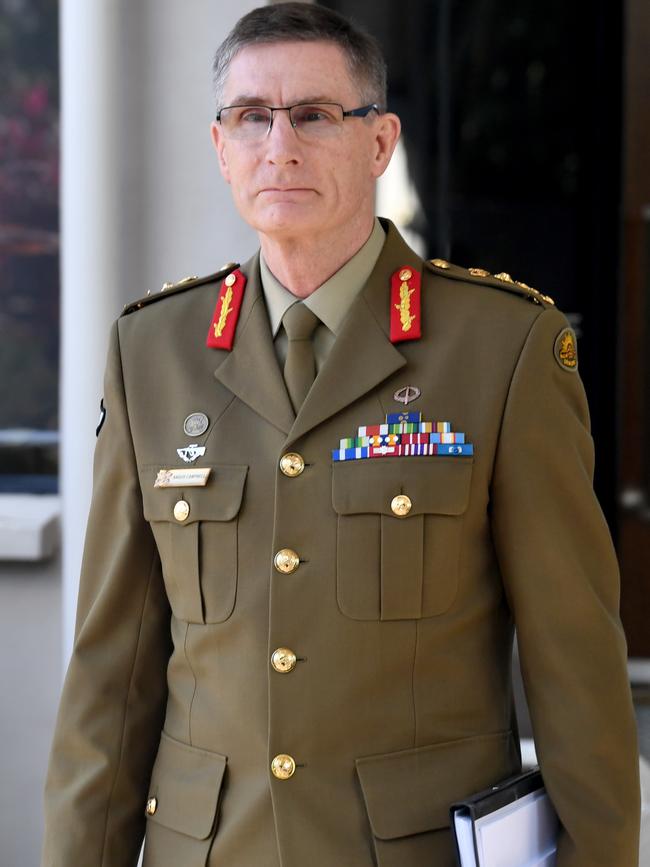
“As someone who’s been involved in dealing with traumatised people and victims for decades, I can assure you a heartfelt apology will go a long way and I hope others take note of what you’ve said today,” Kaldas said, in what some interpreted as a veiled swipe of the dozens of medal-laden officers who chose not to offer the same concession in writing or before his court.
Among them, the Chief of the Defence Force Angus Campbell.
General Campbell previously gave evidence to the Royal Commission in Townsville in June 2022 and, while acknowledging the ADF “is not doing enough” to address Defence and veteran suicide, there was little recognition as he sought to defend the ADF’s position. He was recalled this week to give evidence and was more conciliatory and also apologised for “deficiencies” in wellbeing support.
Indeed, a day before his evidence, Gen Campbell ordered a naval warrant officer fly to the Gold Coast from Canberra and hand deliver a letter from him to one wronged veteran, former Petty Officer John Armfield, to “sincerely and fulsomly apologise”.
But then there has never really been much recognition, at least not from the ADF or Defence, which have long considered this to be a systemic failure of the DVA in dealing with those who leave the service. The groups operate autonomously with their physical processes and systems not even linked, although this was now changing. More broadly, the commission heard there was “deep rooted resistance to change” and today still the “enemy lies within the ADF”.
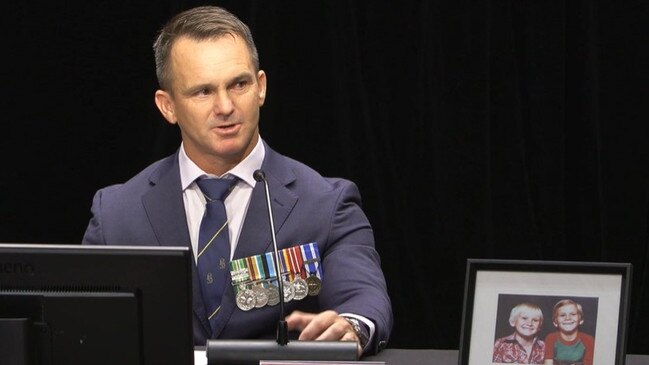
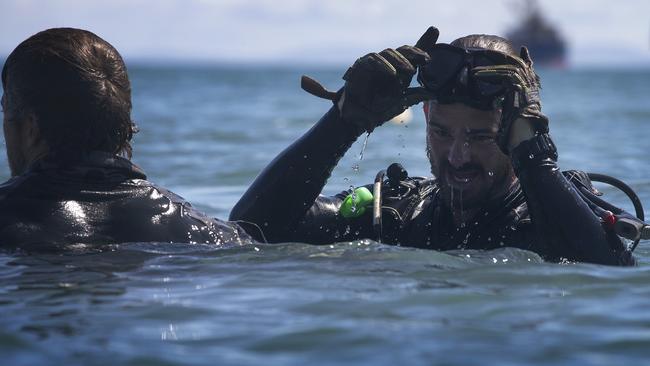
Despite 57 related inquiries and almost 770 recommendations in the two decades preceding the Royal Commission, there has been no improvement in military-related suicide rates.
You could write a tome to rival Tolstoy with the number of heart wrenching stories told to or unearthed by the commission over the past three years and published them under the collective title of a national tragedy.
Many of those stories involved harassment, sexual assaults, bashings, bullying, betrayal, vendettas, codes of silence, abuse of power and, of course, trauma from deployed and other active service – all horrors experienced during service.
Even reporting abuse lines and dealing with issues are arcane and uniquely military, and would not be accepted in civil society such as a lack of clarity around how Defence defines “sexual misconduct”.
Gen Campbell told the commission there was no resistance to change and improvements were happening.
“I am determined to drive change,” he said, agreeing an apology was the beginning not the end of accountability and he believed he had apologised notably when the Brereton report into alleged Afghanistan war crimes was handed down in 2019.
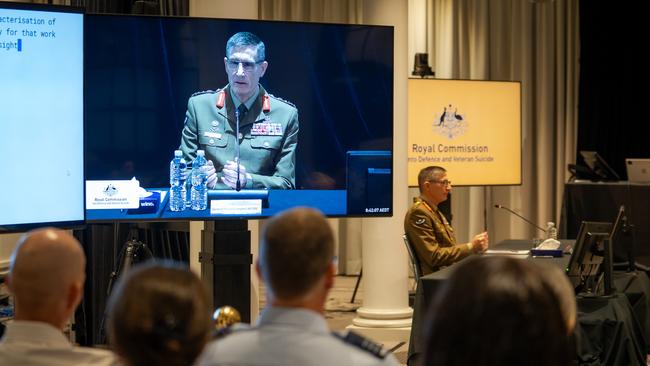
Counsel assisting the commisison inquiry Erin Longbottom KC asked Gen Campebll whether an apology, at a late stage, was enough though and whether organisational failures needed to be looked at and fixed.
“I am very clear across the senior leadership of our organisation, there is a desire to deal with this issue which is good for our people,” he said. “I see no restraint or hesitancy to wanting to deal with this and I do think we are positioning the organisation to finally as an integrated organisation that sees itself as a whole to deal with it ... not in a tabulated box ticking fashion but in profound organisastional change and most importantly progressing cultural change.”
Since the royal commission handed up its interim report in August 2022, much has been put in place to address culture and ethics issues but there is broad agreement, including within Defence, it’s not enough to turn the dial.
That interim report found 13 suicide failures including staff shortages, complex laws, bad admin and a “limited willingness” by Defence to act on historic abuse cases in the ranks as contributing to unacceptably high rates of suicide. Most of those 13 recommendations have been moved on but more are on their way, one of which is for a permanent oversight body to ensure recommendations are followed through on.
“We have to find some real solutions that will have a long-lasting impact,” Kaldas said.
“This is a complex multi-layered problem that will take many years to try and grapple with but we’ve also said you can’t keep doing the same thing the same way over and over again and expecting the result to come out different.”
More Coverage
Originally published as Australian Army Chief Simon Stuart offers ‘sincere apology’ to veterans




